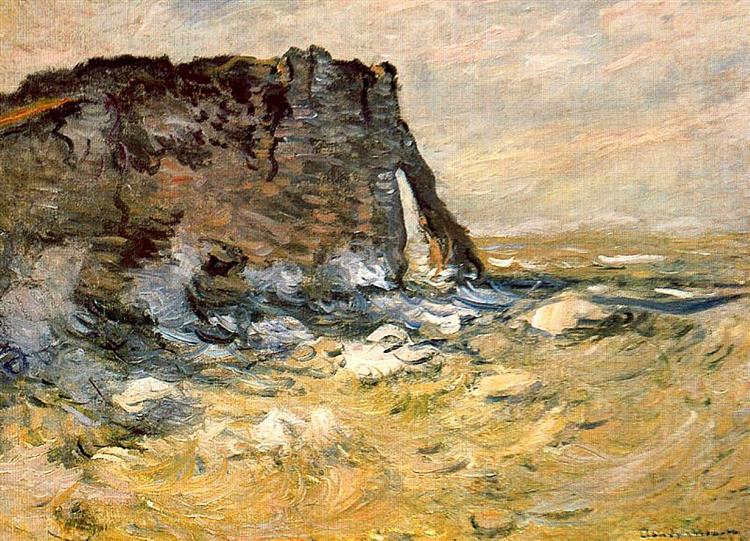Description
In "Puerto de Aval" (1926), Claude Monet presents a work that embodies the mastery of its impressionist style, marking a milestone in its artistic career and reiterating its emotional and aesthetic connection with nature. This oil on canvas, which captures a coastal landscape located in the Normandy region, reveals Monet's unique ability to play with light and color, as well as his obsession with the representation of ephemeral moments in nature. Monet, born in 1840, was a pioneer of impressionism, a movement that sought to break the academic conventions of his time, using rapid brushstrokes and vibrant colors.
The composition of "Port of Aval" is dominated by a structure formed by imposing cliffs, which are erected with majesty over the sea. These cliffs, painted with a palette of grays and beiges, contrast strongly with the vibrant blue of the sky and the soft waves that slide towards the shore. Monet manages to capture the texture of the rock and the fluidity of the water through an amalgam of short and fast brushstrokes, which not only give life to the physical elements of the work, but also invite the viewer to contemplate the passage of time and the changes of light throughout the day.
The work lacks visible human characters, which is characteristic of the Monet approach in the representation of the Pure landscape. However, this absence of human figures emphasizes the relationship between nature and the spectator, immersing the latter in the beauty and majesty of the natural environment. The small candle ships, subtly insinuated in the lower part of the painting, add a sense of scale and dynamism, suggesting human activity without becoming the focus of the work.
Color nuances in "Aval port" are particularly notable, since Monet uses a variety of shades to capture the changing atmosphere of the coast. From the deep blue and the green that evoke the deep waters, to the warm shades of the sunset that caresses the cliffs, each nuance is carefully considered to reflect the light and emotion of the portrayed moment. This color approach is not only a distinctive seal of the Monet technique, but also a reflection of its interest in the subjective perception of the landscape.
The work was created in a period of his life in which Monet's health had been compromised, but despite his personal difficulties, his enthusiasm to paint never faltered. In "Puerto de Aval", there is a clear sense of serenity and transcendence, which suggests that, although the artist faced sufferings, he always found in the landscape the peace and beauty that inspired him.
Monet was inspired by the Norman coasts throughout his life and in previous works such as "Impression, Rising Sun" and "The Ruan Cathedral series", where light and color play a fundamental role. In "Aval port", there is a maturity and refinement that echoes its previous explorations, combined with a sense of immediacy that is characteristic of late impressionism.
In summary, "Aval port" is a testimony of the Monet genius and its indissoluble link with nature. Through its exploration of color, light and shape, Monet not only captures a moment of ephemeral beauty, but also invites the viewer to experience a deeper connection with the natural world. In each line, the impressionist philosophy resonates that painting is an interpretation of reality, a window to the subjective perception of beauty that only Monet could conjure with such mastery.
KUADROS ©, a famous paint on your wall.
Hand-made oil painting reproductions, with the quality of professional artists and the distinctive seal of KUADROS ©.
Reproduction service paintings With a guarantee of satisfaction. If you are not completely satisfied with the replica of your painting, we refund your money 100%.

